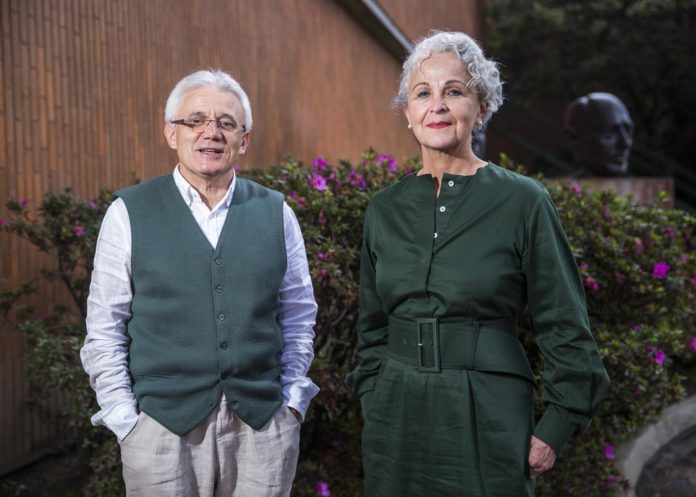Julia Salvi, director and founder of the International Music Festival of Cartagena and general director Antonio Miscena spoke with The City Paper about January’s celestial edition.
The City Paper (TCP): In January, the festival turns 13, how has it changed Cartagena?
Julia Salvi (JS): Cartageneros, I believe, feel that the festival is now part of them. The work we have done to promote the city and give persons from vulnerable communities employment, as well as integrating them into the festival has given them a sense of empowerment and belonging. What we need in Cartagena is stability at a political level, as every four years with a change in the administration we cannot afford to go back to where we began. These moments of instability cause anxiety and take away precious time to focus on the many details of bringing a world-class programme to the city.
TCP: As music director during the last seven years, how has the repertoire changed, if changed at all?
Antonio Miscena? (AM): The Adolfo Mejía Theatre remains at the heart of the festival, but as it is limited in size, we have to work with large chamber ensembles or orchestras with a precise number of musicians. We have always looked to respect the locations where we perform, as it is very important for the festival to create a programme that is original, acoustically coherent with our venues and that reflects the context of the country. The quality of sound is key to enjoying this festival so for chamber music, we perform inside the chapels of Santa Teresa and Santa Clara. There is also a direct historical connection between these venues and composers of the baroque.
TCP: One of the highlights is having the Philharmonia Orchestra in Cartagena for two weeks. What is the festival’s relationship with this renown orchestra?
AM: The Philharmonia Orchestra (PO) is at the heart of the festival with six concerts, including the opening on January 4. A lot of work goes into creating a repertoire that is not part of a “tour” but tailor-made for the occasion. One of the great aspects of working with Philharmonia is that they are very innovative and feel a great sense of responsibility with audiences in Cartagena. They also have a longstanding tradition with performing works that are connected to science, and as the theme for the upcoming festival is Armonía Celeste; it’s a perfect match.
AM: An interesting anecdote with Philharmonia has to do with NASA and a gold-plated record that was launched into outer space in 1977. Voyager 1 is still traveling today with 90 minutes of music, including Philharmonia’s performance of Beethoven’s Fifth conducted by Otto Klemperer.
TCP: Beyond the science of music how does organizing this festival impact Cartagena?
JS: To have 47 musicians of Philharmonia in the city, as well as soloists, chamber ensembles, music directors, and so many others who contribute helps spread the word of Cartagena as an important tourism destination all year long. When musicians come with their families, they take full advantage of the city, from restaurants to hotels, and public spaces. The festival is very much a showcase on Colombia when 30,000 people join us throughout a programme with music for all tastes.
TCP: But it is a festival with an education agenda as well?
AM: When an international music festival in a specific city lives up to its objective, it should transmit what is happening in the rest of the country to the world. The festival allows young musicians to participate in the programme, establish connections, and gain confidence in order to apply for conservatories overseas. Since we began, 45 musicians have been accepted in prestigious academies.
TCP: How does Mozart fit into the theme of Celestial Harmony?
AM: Cosi Fan Tutte is a very symmetrical opera as Mozart was interested in the relationship between mathematics and music. With the opera, one can see the possibilities of what an international music festival can achieve in a co-production, as the Spoleto Festival in Italy is sponsoring this production with a set that will be shipped in a container. We, on the other hand, are in charge of the montage and a performance that includes Italian soloists and musicians, as well as a chorus from Colombia.
JS: Opera allows us to work on a local scale with costume designers, make-up artists and stage technicians. This is important as it shows young people the possibilities of artistic co- operation. If we bring everything to Cartagena, we aren’t contributing to a programme that is unsustainable long-term or meets one of our founding objectives to educate public.
TCP: What’s new in 13th edition?
AM: We are bringing an exhibition of Italian musical instruments to Colombia, sponsored by the Italian government and first for this country. There is also a youth festival at the Convention center with recording engineers, audio experts, and technicians from well-known universities in Bogotá. The workshops and academic agenda will explore how technology and sound are constantly innovating.
Another interesting aspect is the projection of Google’s Virtual Reality team of Philharmonia’s Beethoven’s Fifth to celebrate the 40th anniversary of the launch of the Voyager 1 and 2. Marking this anniversary, conductor Esa-Pekka Salonen worked with Google to film the orchestra, and audiences in Cartagena will be able to feel as if they are traveling through interstellar space.
TCP: We’ve spoken a lot about “heart” of the festival. Any final thoughts?
JS: We will continue to strive to give audiences and a young generation of musicians the chance to hear beautiful music played in a live context. Antonio has shown that he delivers a world-class programme that enriches our understanding of classical music, and opens up horizons for many Colombian musicians with limited resources.

